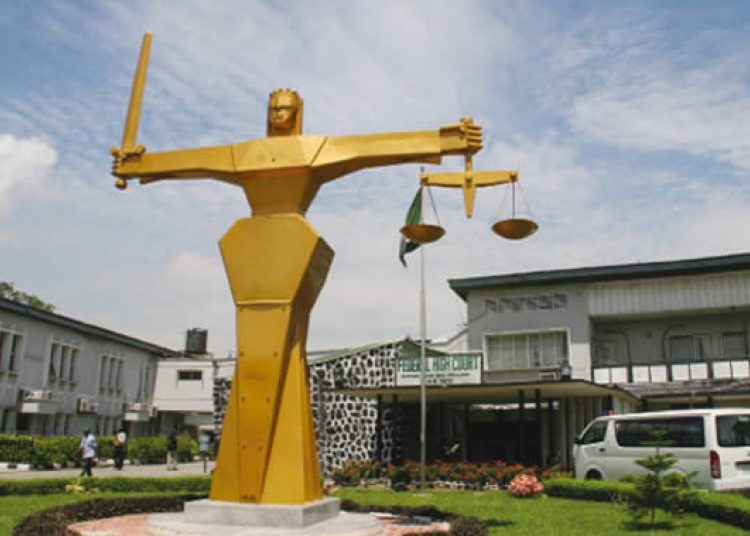The poor remuneration of judges and other judiciary officers has become an issue that requires urgent attention as a way to ensure justice delivery in the country.
Last month, a video showing a female senior magistrate in Anambra State riding a commercial motorcycle, popularly called okada, to work at Neni Chief Magistrates’ Court raised eyebrows and drew attention to the longstanding poor remuneration and conditions of service for magistrates and lower court judges nationwide.
However, this phenomenon is not restricted to lower court judges. Even those at the highest echelons of the judiciary, the Supreme Court, are not spared this humiliation
The recent valedictory speech of the then retiring Supreme Court justice, Justice Musa Dattijo Muhammad, highlighted the ills inherent in the Judiciary, especially the Supreme Court of Nigeria.
According to Justice Dattijo, the salary of Supreme Court Justices has remained static at N751,000 for 15 years without the graduation that occurs in public service. From then to the present time, Supreme Court justices’ salary has not only remained stagnant, but the value has depreciated so much due to galloping inflation over the years. In fact, the purchasing power of their salary is a very tiny fraction of what it was in 2008 , the last time their conditions of service were reviewed. Since then the minimum wage of public servants has been increased. Does it mean the top jurists did not benefit from this wage increase?
More intriguing is the case of the chief justice of Nigeria (CJN) who actually took a pay cut to N400,000 for his elevation as the country’s most senior justice instead of a pay rise. This is the only instance in which elevation in public service results in reduction of salary. This is not acceptable. As a newspaper, we do not understand the rationale behind such practice, but we know that such elevation usually comes with higher responsibilities and higher remuneration. Also unacceptable is the revelation that the chief registrar, an administrator, earns N1.2 million, which quadruples that of the CJN who is the head of the judiciary.
Justice Dattijoe argued, and rightly so, that poor remuneration was a drawback to justice delivery. He quoted former president of the court of Appeal, Justice Mustapha Akanbi, who wrote a publication entitled, The Main Obstacles to Justice According to Law: “A good judgement flows from a mind not bogged down by the thoughts of – where do I get my next meal? Where do I get money to pay my son’s school fees? Poor conditions of service disturb the mind. It is an obstacle to clear and positive thinking.”
If the judges cannot pick their bills, they can more easily succumb to the monetary temptations dangled by the political class. It is as simple as that. In fact, as those at the apex of the third arm of government, they should earn salaries comparable to those of ministers or more.
It is no wonder that corruption in the judiciary has become a talking point in Nigeria of late. However, they may have to look inwards to address their peculiar problem.
Justice Dattijo mentioned that the increasing budgetary allocations to the NJC have not been transparently spent for the benefit of the judiciary. He pointed out that within a period of eight years under the previous administration, the budgetary allocation to the judiciary jumped from N70 billion to N130 billion. Yet, there was no improvement in the welfare of officers working in the temple of justice.
As a newspaper, we wish to state that this is a weighty allegation that warrants a thorough investigation. President Bola Tinubu recently allocated another N35 billion to the judiciary. This is a commendable move. With the revelations in Justice Dattijo’s speech, it has become imperative that he empanels a forensic probe into how the monies allocated to the judiciary has been expended in the last eight years.
We are, in the meantime heartened by the fact that President Tinubu is well aware of the corrosive impact of poor conditions of service for the judges and has pledged to reverse the trend.
In August this year, while receiving the leadership of the Nigerian Bar Association (NBA) at the presidential villa, Abuja, he said: “We must deal with the review of remuneration if we truly want to fight corruption in the judiciary.”
As a newspaper, we agree with the president that raising the remuneration of the judges and justices would help to curb corruption in the sector, however, bribe taking and receiving is a crime and any judge found to have been involved should be made to face the music.
It needs be emphasized, though, that corruption in high places is not necessarily as a result of poor condition of service. The causative factor is greed. Much as we make a case for an upward review of judiciary officers’ emoluments, they, on their part must endeavor to curb their tendency to be commercial in the dispensation of justice.





